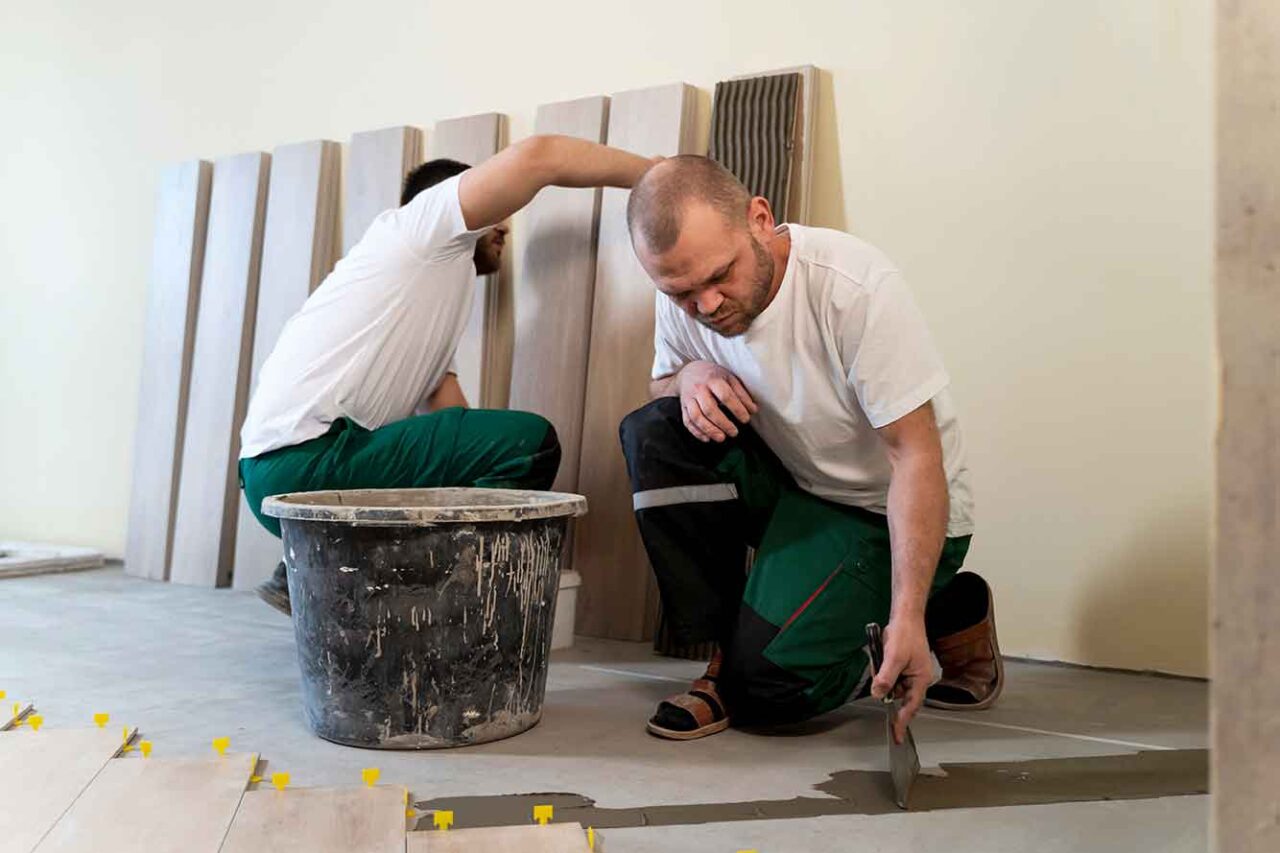Flooring installers and tile and stone setters are skilled professionals who elevate ordinary floors into artistic masterpieces. This blog delves deeper into the world of these craftsmen, exploring their roles, work environment, the path to becoming one, compensation, job prospects, and more.
What They Do: Masters of Flooring Transformation
Flooring installers, tile, and stone setters are the unsung heroes of interior design. Material Selection: These professionals go beyond installation; they possess in-depth knowledge of materials. They assist clients in choosing the right flooring materials based on functionality, aesthetics, and budget. They have the expertise to determine whether hardwood’s warmth, tile’s durability, or carpet’s plushness is the ideal choice.
Precise Measurement: The journey of flooring installation commences with precise measurements. Installers must ensure that each piece fits seamlessly, eliminating gaps or overlaps. This phase demands meticulous focus on detail.
Surface Preparation: Before installing, thorough surface preparation is essential. Depending on the material and the existing floor condition, this could involve cleaning, leveling, or smoothing the surface. The ultimate goal is to create a clean, even, and sturdy foundation for the new flooring.
Installation: This is where the magic unfolds. Flooring installers tile, and stone setters use their expertise to lay down the selected materials, applying adhesives or mortars for secure placement. Whether arranging intricate tile patterns or ensuring seamless carpet seams, precision is paramount.
Finishing Touches: Once the flooring is in place, installers add the finishing touches. This includes trimming edges, adding moldings, and applying sealants or coatings to protect and enhance the floor’s appearance.
In essence, these professionals bridge the client’s vision and the tangible, final result, turning floors into stunning, functional works of art.
Work Environment: Where Craft Meets Physical Demands
The work of flooring installers, tile, and stone setters combines artistry with physical labor. Here’s a glimpse into their work environment:
- Physical Demands: The job is physically demanding, often involving bending, kneeling, and reaching to achieve precise installations. This aspect of the job necessitates strength and stamina.
- Full-Time Commitment: Most flooring installers and tile and stone setters work full-time, though their schedules can vary based on project requirements. Occasionally, they may work evenings or weekends to meet deadlines.
- Varied Settings: These professionals work in diverse settings, encompassing residential homes, commercial spaces, and industrial locations. Each environment presents unique challenges and creative opportunities.
- Teamwork: Depending on project size and complexity, installers may work alone or as part of a team. Collaboration with other construction or interior design professionals is common.
The work environment is dynamic and requires adaptability. Installers must be prepared to work in various conditions and settings, from cozy living rooms to bustling commercial spaces.
How to Become a Flooring Installer or Tile and Stone Setter: Embarking on the Journey
Here’s how you can begin your path to becoming a flooring installer or tile and stone setter:
- No Formal Education Required: Unlike many professions requiring specific degrees, this career path typically doesn’t necessitate formal education. This opens doors for individuals from various educational backgrounds to enter the field.
- Begin as a Helper: Many aspiring flooring installers commence their journey as helpers.
Starting in this entry-level position enables you to acquire fundamental skills in the trade and accumulate valuable experience. - On-the-Job Training: The real learning happens on the job. As a helper or apprentice, you’ll work alongside experienced installers who will impart the intricacies of the trade.
This practical, hands-on training is immensely valuable and equips you for a prosperous career. - Skill Development: Over time, you’ll hone your skills and expertise. You’ll gain knowledge about different flooring materials, installation techniques, and effective problem-solving. Attention to detail and precision are core skills you’ll acquire.
- Certification and Specialization: While not always mandatory, certification can enhance your credibility and broaden your opportunities. Some professionals choose to specialize in particular flooring types, such as hardwood or ceramic tile, which may necessitate additional training or certification.
Becoming a skilled flooring installer or tile and stone setter is a journey marked by apprenticeship and hands-on experience. It’s a career where dedication and passion for the craft can lead to substantial success.
Pay: Rewards of Skill and Expertise
Flooring installers, tile, and stone setters are skilled artisans whose compensation reflects their expertise.
While the median wage offers a general overview, highly skilled and experienced installers may command higher salaries. Additionally, those specializing in premium materials or intricate design patterns may find themselves in high demand, translating to increased earning potential.
Job Outlook: A Stable and Promising Path Ahead
The job outlook for flooring installers and tile and stone setters is optimistic. Projections indicate that the field is expected to grow by 3 percent.
Enhancing your living space has never been easier with FloorPup! Explore our wide selection of hardwood flooring, get expert floor care and maintenance tips, and find inspiration in our gallery. Our professional floor fitters, skilled driveway pavers, and reliable carpet repair services ensure top-quality results. Learn more about our commitment to quality on our about us page. Visit FloorPup and transform your home today!
FAQS
What is the role of a maintenance fitter?
A maintenance fitter plays a crucial role in industrial and manufacturing environments by ensuring the seamless operation of machinery and equipment. Their responsibilities encompass inspecting, repairing, and maintaining mechanical systems, with a focus on diagnosing and resolving issues to prevent downtime and breakdowns. Routine maintenance activities, such as lubrication, cleaning, and the replacement of worn components, are part of their duties aimed at prolonging the equipment’s lifespan. Additionally, maintenance fitters may be involved in the installation of new machinery, interpretation of technical diagrams, and collaborative efforts with fellow team members to enhance overall workplace efficiency and safety. Maintenance fitters are essential for minimizing disruptions and optimizing productivity in their respective industries.
What sets apart a mechanical fitter from a maintenance fitter?
A mechanical fitter typically focuses on assembling and installing mechanical components, working on new machinery, and ensuring precise alignments according to engineering specifications. On the other hand, a maintenance fitter specializes in the ongoing care of machinery, diagnosing and repairing issues, conducting routine inspections, and ensuring equipment’s consistent functionality. While both roles require similar technical skills, their emphasis on either installation or maintenance sets them apart in their day-to-day tasks and job objectives.
What is a Mechanical Fitter?
A Mechanical Fitter is a skilled professional specializing in the assembly, installation, and maintenance of mechanical components and machinery. Their expertise includes reading and interpreting technical drawings, precision measurement, and the use of various tools and equipment.


